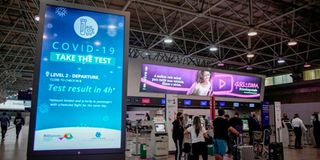Omicron is the new Covid kid on the block: Five steps to avoid, ten to take immediately

A view of the boarding area at the Galeao International airport in Rio de Janeiro, Brazil, amid the Covid-19 coronavirus pandemic.
South Africa reacted with outrage to travel bans, first triggered by the UK, imposed on it in the wake of the news that its genomics surveillance team had detected a new variant of the SARS-CoV-2 virus. The Network for Genomics Surveillance in South Africa has been monitoring changes in SARS-CoV-2 since the pandemic first broke out.
The new variant – identified as B.1.1.529 has been declared a variant of concern by the World Health Organization and assigned the name Omicron.
The mutations identified in Omicron provide theoretical concerns that the variant could be slightly more transmissible than the Delta variant and have reduced sensitivity to antibody activity induced by past infection or vaccines compared to how well the antibody neutralises ancestry virus.
As vaccines differ in the magnitude of neutralising antibody induced, the extent to which vaccines are compromised in preventing infections due to Omicron will likely differ, as was the case for the Beta variant.
However, as vaccines also induce a T-cell response against a diverse set of epitopes, which appears to be important for prevention of severe Covid, it is likely that they would still provide comparable protection against severe Covid due to Omicron compared with other variants.
The same was observed for the AstraZeneca vaccine. Despite not protecting against the mild-moderate Beta Covid in South Africa, it still showed high levels of protection (80 percent effective) against hospitalisation due to the Beta and Gamma variants in Canada.
In view of the new variant, there are a few steps that governments shouldn’t be taking. And some they should be taking.
What not to do
Firstly, don’t indiscriminately impose further restrictions, except on indoor gatherings. It was unsuccessful in reducing infections over the past 3 waves in South Africa, considering 60-80 percent people were infected by the virus based on sero-surveys and modelling data. At best, the economically damaging restrictions only spread out the period of time over which the infections took place by about 2-3 weeks.
This is unsurprising in the South African context, where ability to adhere to the high levels of restrictions are impractical for the majority of the population and adherence is generally poor.
Secondly, don’t have domestic (or international) travel bans. The virus will disseminate irrespective of this – as has been the case in the past. It’s naive to believe that imposing travel bans on a handful of countries will stop the import of a variant. This virus will disperse across the globe unless you are an island nation that shuts off the rest of the world.
The absence of reporting of the variants from countries that have limited sequencing capacity does not infer absence of the variant. Furthermore, unless travel bans are imposed on all other nations that still allow travel with the “red-listed” countries, the variant will directly or indirectly still end up in countries imposing selective travel bans, albeit perhaps delaying it slightly.
In addition, by the time the ban has been imposed, the variant will likely have already been spread. This is already evident from cases of Omicron being reported from Belgium in a person with no links to contact with someone from Southern Africa, as well as cases in Israel, UK and Germany.
All travel bans accomplish in countries with selective red-listed countries is delay the inevitable. More could possibly be accomplished by rigorous exit and entry screening programmes to identify potential cases and mandating vaccination.
Third, don’t announce regulations that are not implementable or enforceable in the local context. And don’t pretend that people adhere to them. This includes banning alcohol sales, whilst being unable to effectively police the black market.
Fourth, don’t delay and create hurdles to boosting high risk individuals. The government should be targeting adults older than 65 with an additional dose of the Pfizer vaccine after they’ve had two shots. The same thing goes for other risk groups such as people with kidney transplants, or people with cancer and on chemotherapy, people with any other sort of underlying immuno-suppressive condition.
South Africa shouldn’t be ignoring World Health Organization’s guidance which recommends booster doses of high risk groups. It should de-prioritise, for the time being, vaccinating young children with a single dose.
Fifth, stop selling the herd immunity concept. It’s not going to materialise and paradoxically undermines vaccine confidence. The first generation vaccines are highly effective in protecting against severe Covid-19, but less predictable in protecting against infection and mild Covid due to waning of antibody and ongoing mutations of the virus. Vaccination still reduces transmission modestly, which remains of great value, but is unlikely to lead to “herd-immunity” in our lifetimes.
Instead we should be talking about how to adapt and learn to live with the virus.
There is also a list of things that should be considered in the wake of the Omicron variant, irrespective of whether it displaces the Delta variant (which remains unknown).
What to do
Firstly, ensure health care facilities are prepared, not only on paper – but actually resourced with staff, personal protective equipment and oxygen, etc.
There are 2000 interns and community service doctors in South Africa waiting for their 2022 placement confirmation. We cannot once again be found wanting with under-prepared health facilities.
Report by Shabir A. Madhi, Dean Faculty of Health Sciences and Professor of Vaccinology at University of the Witwatersrand; and Director of the SAMRC Vaccines and Infectious Diseases Analytics Research Unit, University of the Witwatersrand





